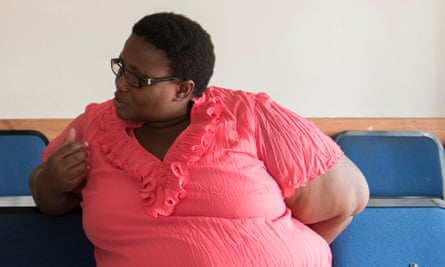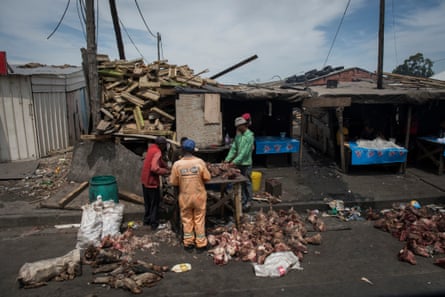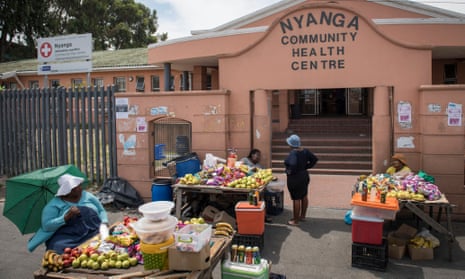When her son Luluto was born 16 years ago, Yoliswa Qaku was eager to have him vaccinated against tuberculosis. Once he received the injection, she thought, he would be safe from the disease for the rest of his life. She learned earlier this year that this was never the case.

Qaku’s community on the outskirts of Cape Town is a poor one, where entire families crowd into small houses, with little space separating them from their neighbours. People are constantly falling sick from TB, which thrives in such conditions. Although Qaku held on to the idea that the vaccine, Bacillus Calmette-Guérin (BCG), was keeping her son well, she wondered why other children who had also been immunised were getting sick with TB.
Earlier this year, a friend told her that the nearby Emavundleni Centre – a branch of the Desmond Tutu HIV Centre – was looking for adolescents who had never had TB to participate in a new vaccine trial. She encouraged Luluto to enrol.
Only when they went to talk to a health worker at the centre did she discover that, although it is effective against some severe forms of paediatric TB, BCG is unreliable against pulmonary TB – the main form of a disease that recently overtook HIV as the leading infectious killer in the world.
“I thought it was better to be protected,” Qaku said. “But there is no way you can do that.”

BCG, which was first administered in 1921, remains the only broadly implemented TB vaccine in the world. In countries where it is part of the package of routine childhood immunisations, like South Africa, 80% of all infants receive it. Despite the vaccine’s widespread use, more than nine million people around the world become ill with the disease each year. In 2014, it killed 1.5 million people.
In Cape Town alone, Dr Linda-Gail Bekker, the deputy director of the Tutu Centre, said officials identify 32,000 TB cases a year – more than the number of patients annually diagnosed in the entire UK. Which leaves Qaku, who now describes herself as lucky that no one in her family has developed TB, wondering what she can do to actually protect them.
The quest for a new vaccine is at the heart of an ambitious new strategy, introduced last month, to end tuberculosis as a public health threat by 2035.
“Unless we have a vaccine, we will not be able to eliminate TB,” said Dr Lucica Ditiu, the executive director of the Stop TB Partnership. “We will drop the numbers down. We will save many lives. But we will not eliminate. The vaccine is the only solution.”
New TB vaccines have not always been a global health priority – far from it, in fact. Of the current crop of about a dozen potential vaccines, the most advanced candidate didn’t reach a large-scale clinical trial until 2009.
Within the TB community, there is still no consensus about when a vaccine should even be introduced. The vast majority of people who are infected with the TB bacteria do not go on to have an active form of the disease. There is a debate about whether a vaccine should be given before the disease is acquired or before it becomes activated.
Bekker, who recently helped launch two vaccine trials, including the one in which Luluto Qaku is participating, said these discussions are extremely important, especially in the prevailing funding environment, where money for TB is in short supply.
“It’s really important that we say, ‘What are the candidates? What are their limitations? Which ones do we want to move forward?’ So that we use the money in the best possible way.”
This lack of funding, health officials agree, has not just slowed the search for a vaccine, but also helped catapult TB to the top of the list of deadliest diseases.
“There’s been not a lot of emphasis on TB, in general,” Bekker said. To underscore her point, she highlighted the difficulty her team had in identifying even 60 adolescents from the communities around their clinic who had never been infected with TB. To find them, they ended up screening more than 600 people.

The new Global Plan to End TB calls for a $56-58bn (£37-38bn) investment in TB programmes, alongside $9bn for new research and development, including vaccines.
“If we don’t find a vaccine that actually works, we won’t hit the targets,” said Aaron Oxley, the executive director of Results UK. “It’s just an essential, essential investment.”
In the meantime, as the global health community awaits the money that will allow scientists to start developing or improving vaccines, they are turning to new, more refined tools to help curb the epidemic.
At the start of the recent World Conference on Lung Health, the TB Alliance announced a paediatric drug formulation – the first of its kind – which means that, soon, parents will no longer have to chop up adult medicines into smaller doses for their sick infants. Advanced diagnostic equipment is also being rolled out in countries like South Africa.
But only a vaccine, Oxley and others agree, would actually end the epidemic. “It’s very clear we’re not going to treat our way to zero TB.”

Comments (…)
Sign in or create your Guardian account to join the discussion